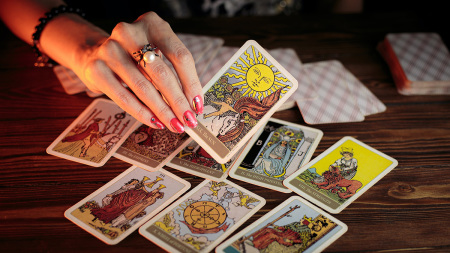Most Americans believe in karma, over 25% believe in reincarnation, astrology: survey

Nearly nine out of 10 Americans say they believe in at least one belief that falls under the loosely defined umbrella of new-age spiritualism, while about a quarter believes in reincarnation, parallel realities and telepathy, a new poll suggests.
A YouGov poll released this week asked 1,000 adult Americans whether they hold 20 beliefs loosely defined as "new-age spiritualism." The survey found the overwhelming majority of respondents (87%) hold at least one of those beliefs, including karma, which is defined as the belief that a person's action or conduct in this life or lives to come will influence their ultimate destiny.
Nearly half (45%) say they believe in at least five of the "new-age spiritualism" beliefs. The YouGov report notes that many new-age principles can "overlap with tenets of other religious and cultural worldviews, including Christianity."
The survey, conducted in August, has an error margin of 4 percentage points.
Roughly 55% of Americans said they believe karma is real, while 41% believe in hypnosis, 39% believe in UFOs/extraterrestrials, and 29% believe in the "law of attraction," also known as manifesting, which states that positive or negative thoughts will bring correspondingly positive or negative experiences.
About 27% say they believe in reincarnation, while 26% believe in astrology, 24% believe in parallel realities and another 24% believe in telepathy.
The majority of respondents (68%) said they at least somewhat agree with the view that "everything happens for a reason." Most Americans viewed goals that emphasize an interdependent relationship between mind, body and spirit, including the idea of living in harmony with nature, as at least somewhat important (68%).
Over a quarter of respondents (28%) said they strongly agreed with the statement, "Everything is God and God is everything," a new-age belief more commonly known as pantheism. Twenty-two percent said they somewhat agree with that statement.
A quarter of respondents (24%) strongly disagreed with that statement, while another 10% said they were unsure.
When asked, "How important is religion in your life?" 38% said it was very important, while 22% of respondents said religion was "not at all important" in their life.
But while new-age ideas were generally acceptable, Americans were less accepting of phenomena involving the ability to see the past or the future, such as consulting psychics, tarot card readers and fortune tellers, according to the survey.
Over half (56%) said they did not believe in tarot card readings, compared with 15% who said they did believe in the practice, while nearly another quarter of respondents said they weren't sure.
Americans who took part in the survey said the two concepts with which they were least familiar were chakras, which are considered by some to be energy points in the human body, and astral projection, the alleged ability of one's spirit to be able to travel outside of the body.
Another 42% of respondents voiced support for alternative medicine, a broader category encompassing many of the survey's questions. But when it comes to healing practices involving energy or vibration work, Americans were more skeptical, with less than one in five voicing support for energetic/vibration healing (18%), the use of healing crystals (14%) and Reiki (11%).
But that skepticism did not apply to more common new-age practices seeping into popular culture. Meditation and "mindfulness" were popular with 26% and 21% of respondents, respectively, while Pilates, tai chi and other practices were engaged in by 6% or less of Americans surveyed.
While so-called new-age beliefs have simmered in the American consciousness since the 1960s, the more specific definition of the "New Age" stems from decades earlier, when a "number of Anglo-American groups announced they were receiving messages from intelligent beings from other planets who were coming to bring a New Age to the Earth," according to the Encyclopedia of Psychology and Religion (EPR).
Although there are untold variations, generally speaking, the New Agers believe that the world will face some apocalyptic catastrophe at some point in the relatively near future — similar to what is described in the book of Revelation.
That period will then be followed by a "new age" of peace, prosperity and spiritual evolution, but only those who are "attuned" to the new "consciousness" will survive, according to EPR.
Christian theologians have long warned of the dangers of new-age beliefs and other related teachings as some Christians practice witchcraft and others use so-called "Destiny" cards, which critics have likened to tarot cards.
A Christian Post report from 2017 found millennials are increasingly exploring and turning to occultic spirituality and astrology, as statistics show the rise of religious "nones," those who do not identify with any particular faith.
According to MarketWatch data at that time, the psychic services industry grew 2% between 2011 and 2016, an industry worth approximately $2 billion.
Ian M. Giatti is a reporter for The Christian Post. He can be reached at: ian.giatti@christianpost.com.





















